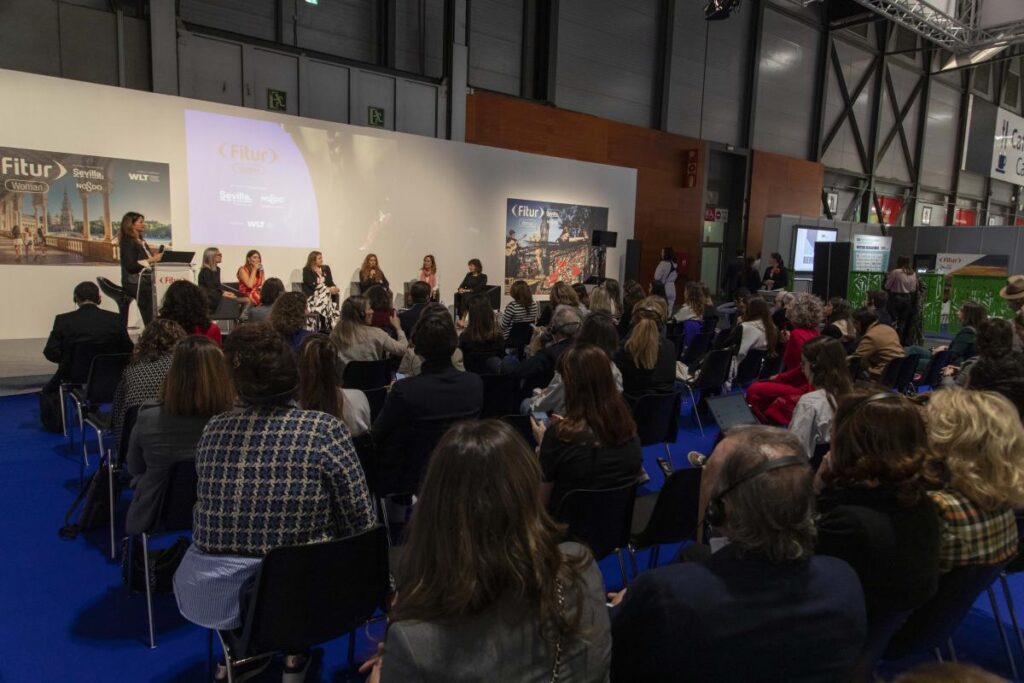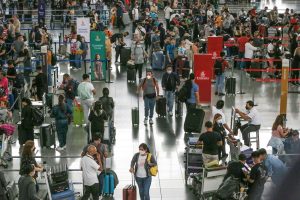The participants in this section of FITUR highlight that female employment represents 54% and has increased by 24% since 2010, but there is still not enough representation in leadership positions.
The experts and professionals participating today in FITUR Woman 2024 made it clear that diverse and inclusive leadership is indispensable in the tourism sector. They noted that female employment in this sector has increased by 24% since 2010, but women are still under-represented in management positions. Under the slogan ‘Promoting Inclusion in Tourism’, the speakers at the fourth edition of FITUR Woman, organised by FITUR, in collaboration with Women Leading Tourism (WLT) and sponsored by Seville, discussed the role of female workers in the tourism industry and highlighted the importance of ensuring sustainable and inclusive tourism.
Rosana Morillo Rodríguez, Secretary of State for Tourism of the Spanish government, stated that “despite all the progress made, there is still a long way to go and a lot of recognition to be gained”. A task in which there has to be “alignment and collaboration between the private and public sectors”. In addition, Morillo emphasised the public policies needed so that “women can have the same opportunities as men to access jobs”; and stressed the need for “socially sustainable tourism”.
For her part, the President of Women Leading Tourism (WLT), Maribel Rodríguez, explained that female employment in tourism has increased by 24% since 2010. “Right now, our industry comprises 54% of female workers, which is far higher than other economic sectors. However, the proportion of women in management remains in single digits. Not enough women are represented on boards of directors, committees and as company chairpersons.
Female employment in Latin America
The day’s events were followed by a round table discussion on the impact of female employment in Latin America, in which various speakers described the experience of public authorities. Mara Lezama Espinosa, Governor of Quintana Roo, said that “women can do extraordinary things” and called for “improving the quality of life of all human beings”. She assured that “we have formed a different government, where the presence of women is present and latent. Quintana Roo is the state with the highest presence of women in municipal presidencies and in the local chamber of deputies”. She also highlighted the “Mujer es poder” (woman is power) programme, which aims to strengthen the resources of the female population.
For her part, Reyes Maroto, honorary member of WLT and former Spanish Minister of Tourism, Industry and Trade, underlined the success of FITUR Woman and affirmed that “equality poses a challenge for a better society”. In addition, she stressed the need to make an effort “so that women become more visible in the tourism sector and reach positions of power”. In this regard, she recalled the government’s work to empower women in the economic and business sphere. According to Maroto, “we must continue to make tourism a lever for social and economic transformation in order to propel more women into leadership and decision-making positions”.
Cary Pierluisi, Executive Director of the Government of Puerto Rico, said that “we must work to ensure that women occupy the spaces that are rightfully theirs”. She said they are doing so in Puerto Rico, in order to “assess all people based on merit and equalise salaries between men and women”. Along this line, she explained that “we are empowering and training women in the tourism sector and giving them all the support they need, setting up different programmes”
Finally, Denise Guillén, Panama’s Minister of Tourism, spoke about the Empreturismo project, promoted by the government of Panama, which has several specific programmes for women to enhance the visibility of their businesses. In addition, Guillén highlighted the role of women in the tourism sector, stating that “tourism makes women visible in indigenous communities, because it is these women who are the keepers of traditions”.
FITUR Woman also featured a round table on Seville as a success story in integration, in which various speakers shared their business experiences in different segments. Angie Moreno, delegate for Tourism of the Seville City Council, stated that “the role of women in the tourism industry is fundamental”; and pointed out that “63% of Seville’s hotel industry is made up of women”. Businesswoman Laura Sánchez from We Love Flamenco said that “flamenco fashion is an industry and an attraction for Seville and for the whole of Andalusia” and advocated that “flamenco fashion should be seen as an icon of the Andalusian woman”.
Entrepreneur, model and presenter Raquel Revuelta, from SIMOF affirmed that “the importance of women in tourism is fundamental and we must take advantage of the pull of flamenco fashion, which is a tourist asset and can position Seville all over the world”. Ana Moreno from Inés Rosales said “women also contribute a lot to gastronomy”, adding that “in the primary sector we find a lot of female labour”. Marina Carrasco of El Palacio Andaluz explained that “although the world of flamenco has generally been more male-dominated, in recent years there have been many female flamenco artists who have given it an innovative twist”. And finally, Rosana González director of the Hotel Meliá Colón, pointed out that “women hotel managers only represent 24%, a proportion that is higher in luxury establishments”, but added that “we continue to grow”.
The day closed with other panels on inclusive team building, diversity as a strategic lever with tangible benefits, sustainability and the social impact of tourism.







